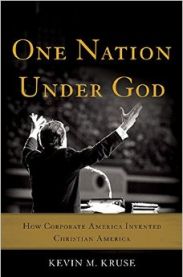Princeton professor claims the 'Christian nation' idea was invented by corporate America

A Princeton history professor has claimed that the idea of America as a Christian nation was invented by corporations, and that the link between capitalism and religion is still strong until now.
In an interview with The Religious Dispatch, Kevin Kruse, author of One Nation Under God, argued that the idea of a Christian nation was floated as early as the nineteenth century at the height of the Civil War but it wasn't until the 1950s that it made any traction.
"During the postwar religious revival, countless slogans and ceremonies that we now take for granted—the National Day of Prayer, the National Prayer Breakfast, the phrase "one nation under God" in the Pledge of Allegiance, the formal motto "In God We Trust"—were established in quick order," he said.
However, the connection between capitalism and Christianity, he said, really took off when Christian libertarians started to draw parallels.
"Both systems reflected a belief in the primacy of the individual: in Christianity, the saintly went to Heaven and the sinners to Hell; in capitalism, the worthy succeeded and the inept went broke. Any system of government that meddled with this divinely inspired order, they argued, was nothing less than "pagan statism," he said.
He added that in alliance with big business, the Christian libertarians began to popularise the slogan "freedom under God" on various forms of media, and even in the themes of sermons.
During the Depression, Kruse claimed that big business used religious leaders to help them win back the trust of the public who blamed the corporations for the economic losses suffered from the Great Crash.
"Realising that the direct approach hadn't worked, these business leaders decided to outsource the work. In their private correspondence, they noted that polls proved ministers were the most trusted men in America and so they decided to recruit clergymen to make the case for them," he said, according to The Religious Dispatch.
As the notion of the Christian nation became stronger, it was embraced by politicians, and has, in the years that followed, become part of the US political identity, Kruse claimed. Recent events, he believes,have only solidified the connection between Christian libertarianism, politics and capitalism.
He cited the recent court ruling allowing corporations to be exempt from the contraception mandates of the Affordable Care Act for religious reasons, and the arguments being heard over the rights of businesses to refuse to provide services to same sex marriages on religious grounds.
"So we're currently witnessing a resurgence of that ideology in American law with the idea that corporations not only are capable of having religious beliefs, but that such beliefs make these businesses exempt from the laws of the regulatory state," he said.











